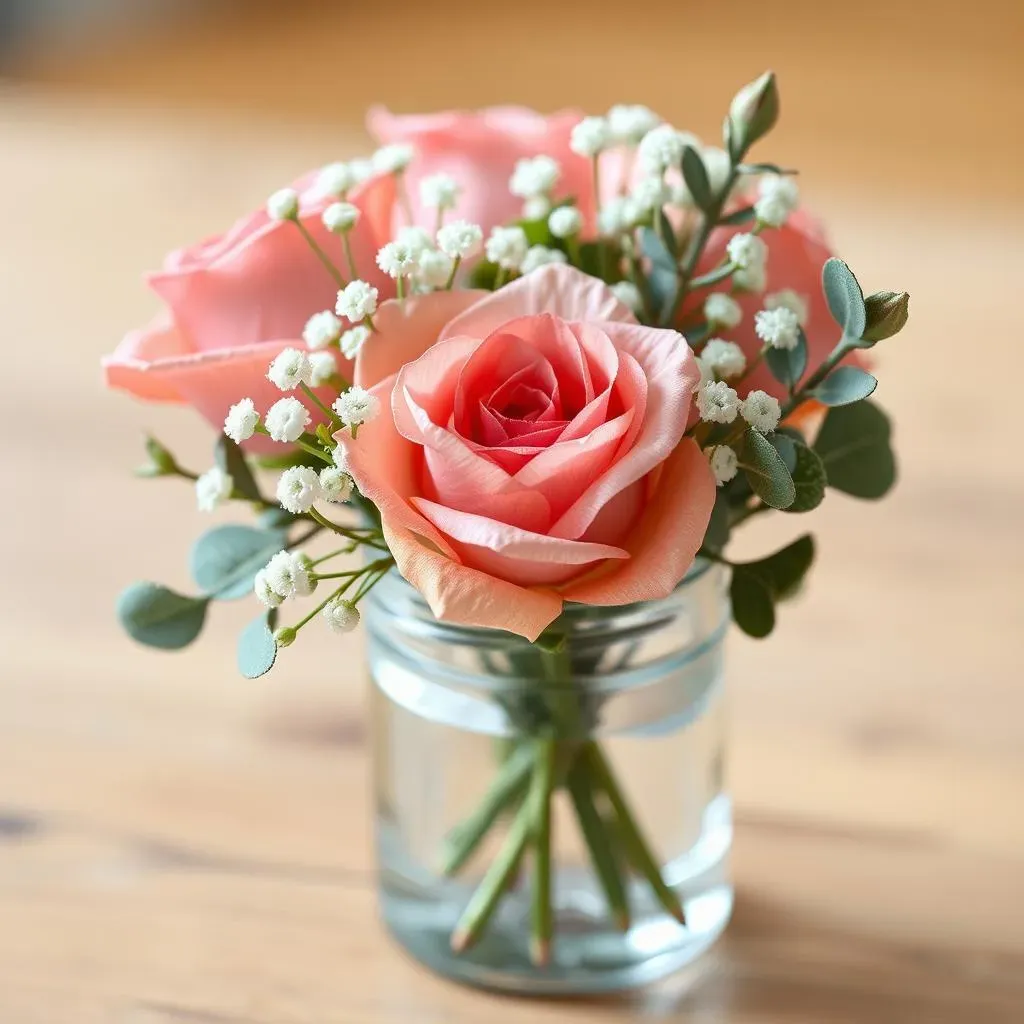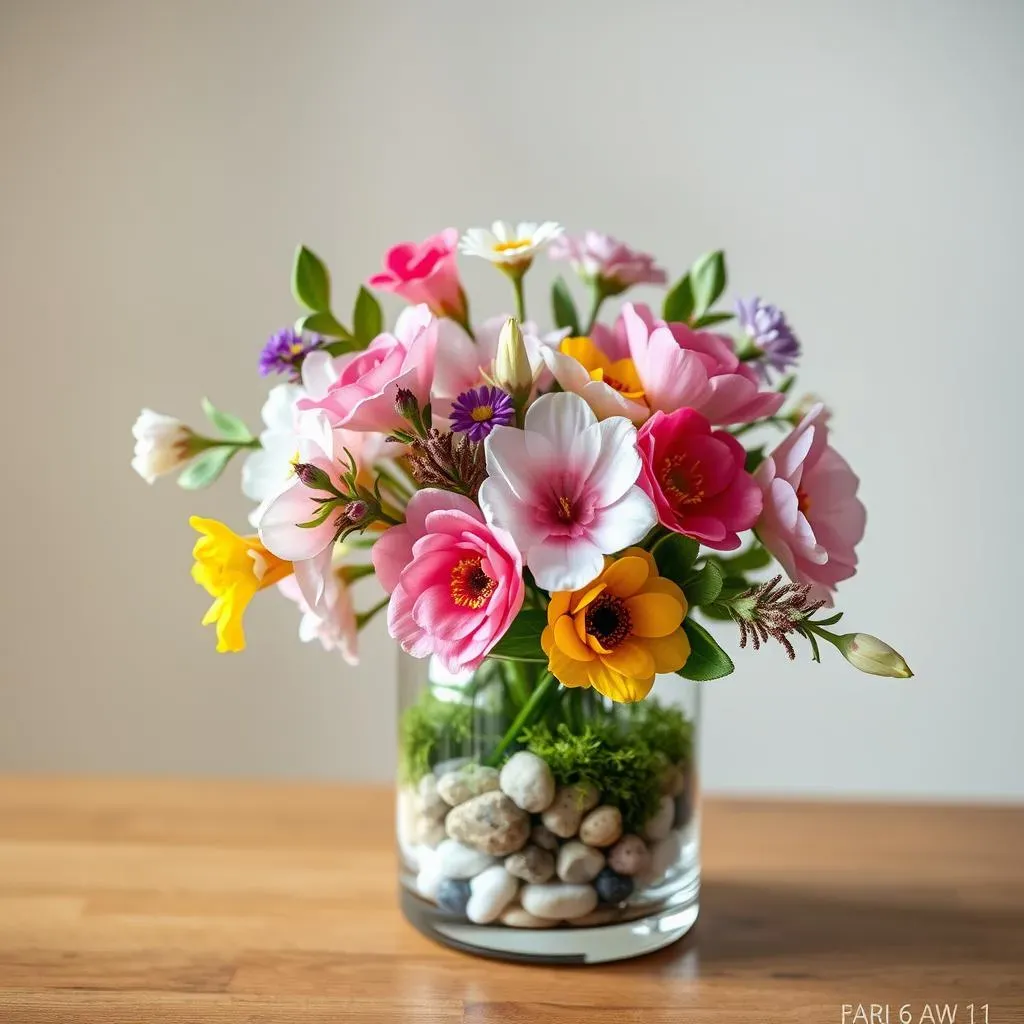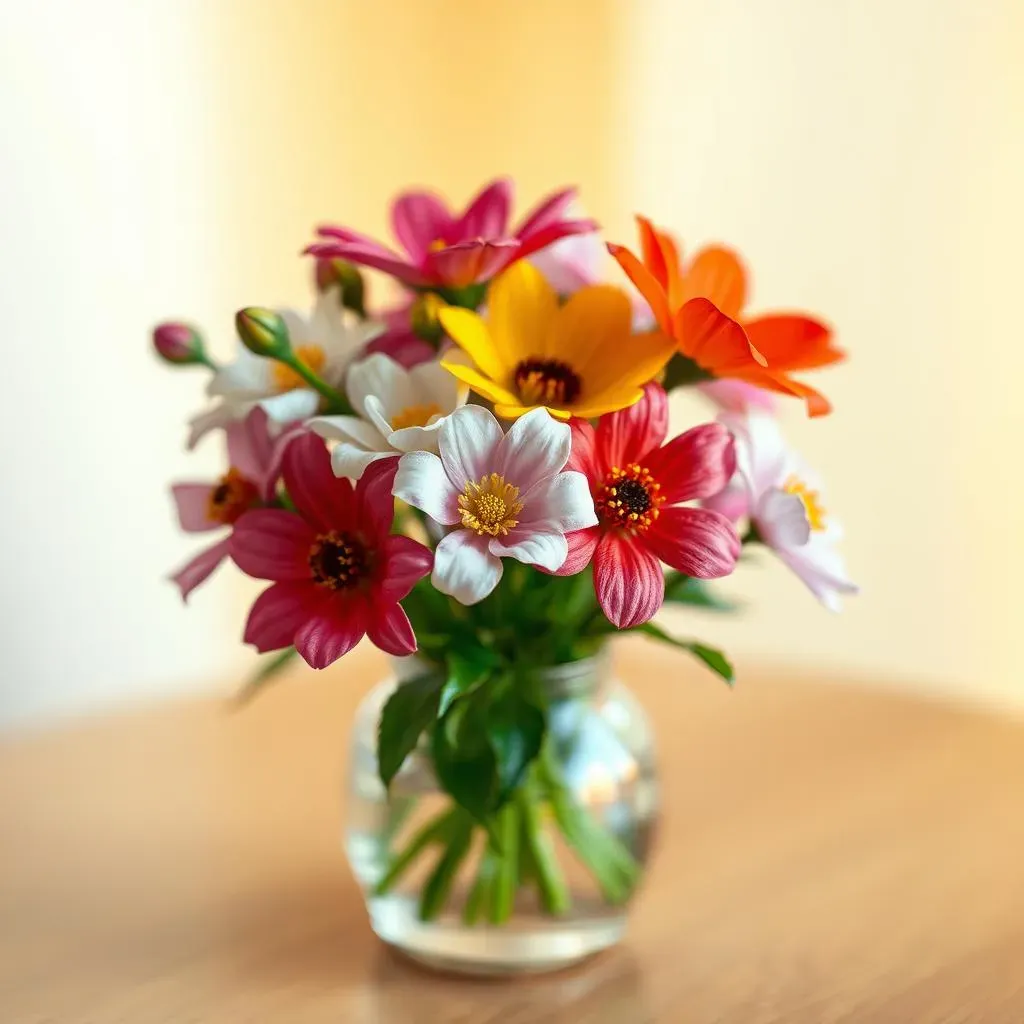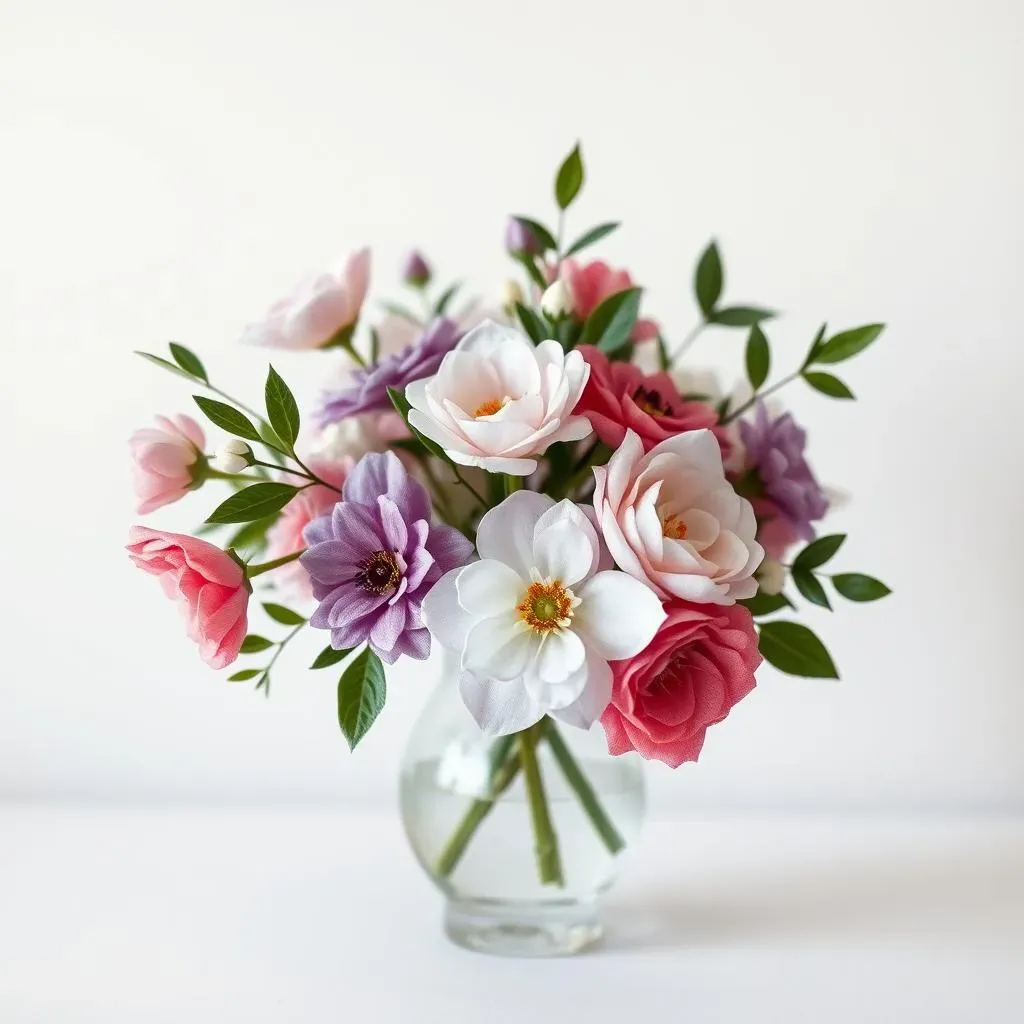Table of Contents
Ever stared at a small vase and a bunch of artificial flowers, wondering how to make them look less like a craft project gone wrong? I've been there, trust me. It's easy to end up with something that looks stiff and unnatural, but don't worry, it's totally fixable. This isn't about just shoving stems into a container, it's about creating a little piece of art that brightens up your space. In this article, we’ll tackle the art of how to arrange artificial flowers in a small vase, turning those tricky little vases into beautiful displays. We will start by picking the right flowers, then I'll walk you through the actual arranging process, and finally, I'll share some pro tips. We'll also discuss common mistakes, so you can avoid the usual pitfalls. By the end of this guide, you'll be arranging artificial flowers like a seasoned florist, making your small vases sing.
Choosing the Right Artificial Flowers for Your Small Vase
Choosing the Right Artificial Flowers for Your Small Vase
Size Matters: Thinking Small
First things first, when we’re talking about small vases, we have to think small, right? It’s like trying to fit a basketball into a teacup, you just can't do it. So, those huge, showy blooms that look amazing in a giant floor vase? Yeah, they're going to overwhelm our little guys. Instead, go for flowers with smaller heads. Think delicate roses, sweet peas, or maybe some cute little daisies. The goal is to pick blooms that won’t look like they're bursting out of the vase. Also, consider the stem length. You want stems that are either naturally short or easy to trim. We're aiming for balance, not a floral explosion.
I remember once trying to cram these enormous peonies into a tiny bud vase. It looked ridiculous, like a cartoon flower trying to escape. Now I always check the size first.
Variety is Key: Mix and Match
Don't just grab a bunch of the same flower and call it a day. That’s a surefire way to make your arrangement look boring. Think about adding different textures and shapes to your arrangement. Mix in some filler flowers, those smaller blooms that add volume and interest, like baby's breath or some delicate sprigs of greenery. Adding foliage is super important, it gives the eye somewhere to rest and makes the whole thing look more natural. The trick is to create a sense of depth, you want to draw the eye in and keep it interested.
It's like putting together an outfit, you don't just wear one color, you mix and match to make it interesting.
Flower Type | Example | Why it Works |
|---|---|---|
Focal Flower | Small Rose | Draws the eye |
Filler Flower | Baby's Breath | Adds volume |
Foliage | Eucalyptus Sprigs | Adds texture and balance |
Color and Style: Setting the Mood
Finally, let's talk color and style. What kind of vibe are you going for? Do you want something bright and cheerful, or maybe something more calm and elegant? The colors you choose will set the whole tone for your arrangement. If your vase is clear, the colors will show through so keep that in mind. Consider the room where you'll display the arrangement. If it's a bright, sunny room, you might go for bold, vibrant colors. If it's a cozy, quiet space, you might want something softer and more muted. And of course, think about the style of your vase. A sleek, modern vase might call for something minimalist, while a rustic vase might look great with a more bohemian arrangement.
It’s like picking a playlist for a party, you want the music to match the mood, right?
StepbyStep Guide: Arranging Artificial Flowers in a Small Vase
StepbyStep Guide: Arranging Artificial Flowers in a Small Vase
Prep the Vase: The Foundation
Alright, so you've got your flowers, now let’s get our hands dirty. First, let's talk about the vase itself. If it's a clear vase, I like to add something to the bottom to hide the stems. You can use pebbles, glass beads, or even some decorative moss. It just makes the whole thing look more polished. Now, if you're using a vase that's not super stable, you might want to add some floral foam or even a bit of modeling clay to the bottom. This will help keep your flowers in place and prevent them from toppling over, it is a little trick that I learned from a florist friend. It's like building a solid foundation before you start constructing a building, you need to have something stable to work with.
I once had a vase that was so top-heavy, it kept falling over. Now, I always add some weight to the bottom before I start arranging.
Start with the Focal Flowers: The Main Attraction
Next up, let's place our focal flowers. These are the stars of the show, the ones that draw your eye in. Start by placing the largest or most prominent blooms first. Don't just stick them straight in, angle them slightly, and vary their heights. This creates movement and makes the arrangement look more natural. Imagine you're placing the main characters on a stage, you want them to be the center of attention, but not in a boring, straight line. You want them to be the focal point, but also complement each other.
Think of it like arranging a group photo, you don't put everyone in a straight line, you stagger them to create interest.
Step | Action | Why it Matters |
|---|---|---|
1 | Add weight to vase | Keeps the arrangement stable |
2 | Place focal flowers | Creates a focal point |
3 | Add filler flowers and foliage | Adds depth and texture |
Add Filler and Foliage: The Supporting Cast
Now, let's bring in our supporting cast: the filler flowers and foliage. Tuck these in around the focal flowers to fill in any gaps and add texture. You can use a variety of greens, like eucalyptus or ferns, to create a natural look. I like to twist the stems a little as I add them, so they don't look too stiff. Don't be afraid to let some of the foliage cascade over the edge of the vase, it adds a touch of whimsy. Remember, these are the elements that make the arrangement look full and lush, they are the unsung heroes of the show.
It's like adding spices to a dish, they enhance the flavors and make the whole thing more interesting.
Expert Tips for Stunning Artificial Flower Arrangements in Small Vases
Expert Tips for Stunning Artificial Flower Arrangements in Small Vases
The Power of Trimming: Getting the Right Length
Okay, let's talk about the unsung hero of floral arranging: trimming. Seriously, I can't stress this enough. Those artificial stems often come way too long, and they'll look awkward sticking way out of a small vase. You've got to be ruthless with those clippers! Don't be shy, trim them down to a length that complements your vase. I usually start by holding the stem up to the vase and then trimming it a bit shorter than I think I need. It's way easier to trim more off than it is to add length back on. Think of it like tailoring a suit, you want it to fit perfectly, not be all baggy and loose.
I once left some stems way too long, and they ended up looking like a bunch of unruly teenagers trying to escape the vase. Now, I always trim first.
Bending and Shaping: Adding Natural Movement
Artificial flowers, they can sometimes look a little too perfect, right? That's where bending and shaping comes in. Don't be afraid to gently bend the stems to create a more natural, organic look. You can curve them, twist them, or even give them a slight lean. This makes the whole arrangement look more dynamic and less like a rigid, artificial display. I like to imagine how real flowers would naturally grow and try to mimic that. It's like adding a little bit of personality to each stem, you want them to have their own unique character. It’s a small change but makes a world of difference.
It's like posing for a photo, you want to create a pose that looks natural and effortless, not stiff and awkward.
- Use wire cutters to trim stems.
- Bend stems to create curves.
- Angle stems to create movement.
The Art of Fluffing: Bringing Flowers to Life
Finally, the last step, and one that's often overlooked, is fluffing. This is where you take a step back and look at your arrangement as a whole. Gently adjust the petals and leaves to make them look more full and natural. You can also rotate the vase so you can see the arrangement from all angles. Sometimes, a little tweak here and there is all it takes to elevate your arrangement from good to great. It’s like adding the final touches to a painting, you want to make sure every detail is just right. Don't be afraid to play around with it until you're happy with the result. Remember, arranging artificial flowers should be fun, so let your creativity flow.
It’s like styling your hair, you want to fluff it up and make it look its best before you leave the house.
Tip | Action | Why it Works |
|---|---|---|
Trim Stems | Use wire cutters | Ensures the flowers fit the vase |
Bend Stems | Gently curve them | Creates a natural look |
Fluff Flowers | Adjust petals and leaves | Adds volume and texture |
Wrapping Up Your Artificial Flower Arrangement
So, there you have it—turning a small vase into a stunning floral display isn't as hard as it looks. It's all about choosing the right flowers, playing around with the arrangement, and not being afraid to tweak things until it looks just right. Remember those tips about varying heights and using filler? Those are your secret weapons. And if you mess up? No big deal! Artificial flowers are super forgiving; you can just pull them out and start again. Now go forth and create some gorgeous mini-arrangements that will make any space feel a little brighter and happier. It's your time to shine, with flowers that never fade.
